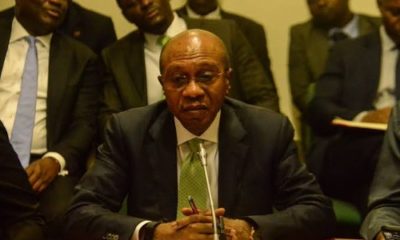Finance
CBN announces low-interest loans for 1M Nigerian graduates

By Yemie ADEOYE
LAGOS -THE Central Bank of Nigeria, has announced that it is now set for the commencement of a low-interest loan scheme for one million young graduates in the country.
The statement made by the governor of the apex bank Mr. Godwin Emefiele also noted that the special loan scheme, which would be managed by the central bank in collaboration with commercial banks would commence in 2016, and was part of the strategy of the Federal Government to boost the Micro, Small and Medium Enterprises sub-sector and curtail unemployment among the youth.
The CBN Governor made the disclosure in Lagos during the opening ceremony of the seventh Annual Bankers’ Committee Retreat.
The CBN governor said, “We need to get more and more people to be employed, and we will need the support of the banks to begin to see how we lower our risk acceptance criteria to give support to our young graduates.
“In the course of the next few weeks, we will be unfolding a plan of support of the CBN to create employment for at least one million young graduates in Nigeria in 2016. That will entail support from Nigerian banks and our development institutions to see how we will channel these concessionary loans to companies that are MSMEs.”
Emefiele said the plunge in commodity prices, especially crude oil, had led to sharp fall in the nation’s revenue, adding that Nigeria and other oil exporting countries were facing hard times, a situation that necessitated the need to diversify the economy away from oil.
According to the CBN boss, the MSMEs represent the engine room of growth of any economy and there is a need for Nigeria to focus on the sector in order to weather the trying times.
He said, “The drop in commodity prices is a major thing that has affected the country. What that means is that your revenue has dropped and we are facing very serious pressure on our external reserves and exchange rate. What that does is that we all need to think about how we should come together and see what we can do as a people to shield ourselves from what is happening. So, we need to do whatever we can to protect the economy.
“We are entering a phase where we believe that the SMEs must be the only priority for growth in our economy. I must say that the Nigerian banking sector has not played an active part in supporting the SMEs, but this is not without reasons. We had issues in the past where people took loans and didn’t pay.
“The SMEs are seen as drivers of growth in any economy. Nigeria has 37 MSMEs. The CBN has a N220bn MSME facility. We have used various approaches to stimulate lending to the SMEs through that fund and I must confess that we are not doing enough on that because less than half of that fund has been disbursed today.”
Emefiele urged the bank MDs and heads of financial institutions at the meeting not to shy away from lending to the real sector, adding that the proposed loan scheme for young graduates must work.
He said, “Let’s give the young graduates a chance. The SME programme is going to be separate from the N220bn MSME fund, and I am saying if you (the banks) refuse to support, your money that we would have released through the Cash Reserve Ratio, we will take that money and lend it through any channel that will give these young graduates jobs.
“We all need to think together and agree because there is no need to release the money to you and all you do with the money is buy treasury bills. It can’t continue. We need to think about the best ways to diversify this economy away from oil.”
Meanwhile, the Minister of Finance, Mrs. Kemi Adeosun, who was also present at the opening of the retreat, disclosed that the Federal Government would be borrowing to stimulate the economy.
She said Nigeria was facing a very challenging economic situation and there was a need to focus on the SME sector to boost growth.
“the government will be doing all that needs to be done on the fiscal side of the economy to ensure that the money that will be borrowed is not spent on recurrent expenditure but on capital projects” she enthused.
Banking
CBN Denies Currency Devaluation

The Central Bank of Nigeria (CBN) has refuted claims of devaluing the.
Earlier reports suggested that the CBN had devalued the Naira, lowering its exchange rate from N631 to the dollar, compared to the previous day’s rate of N461.60 at the Importers and Exporters (I&E) window.
However, the Central Bank of Nigeria (CBN) released a statement on Thursday through its Acting Head of Corporate Communications, Dr. Isa Abdulmumin, categorizing the report as false information.
In the statement titled ‘CBN Has Not Devalued The Naira’, he said the attention of the apex bank was drawn to the news report by an Abuja based newspaper edition of June 1, 2023, titled “CB Devalues Naira To 630/51”.
However, the CBN stated categorically that the news report was replete with outright FALSEHOODS and destabilizing innuendos, ‘reflecting potentially willful ignorance of the said medium as to the workings of the Nigerian Foreign Exchange Market.’
“For the avoidance of doubt, the exchange rate at the Investors’ & Exporters (I&E) window traded this morning (June 1, 2023) at N465/USS1 and has been stable around this rate for a while.
“The public is hereby advised to ignore the news report by Daily Trust in its entirety, as it is speculative and calculated at causing panic in the market,” the CBN spokesman added.
He, therefore, advised media practitioners to verify their facts from the Central Bank of Nigeria before publishing in order not to misinform the public.
Banking
BREAKING: CBN Increases Interest Rate By 0.5%

The interest rate in Nigeria has been raised to 18.5 percent, up by 0.5 percent, from 18 percent where it was pegged in March 2023.
The Central Banks of Nigeria’s (CBN) Monetary Policy Committee (MPC) resolved to this effect at its third meeting of 2023 in Abuja, on Wednesday.
Governor, CBN, Godwin Emefiele, made the disclosure in the communiqué of the MPC’s meeting, thereafter.
While engaging the media at the end of the two-day meeting, Emefiele, said the committee voted to keep the asymmetric corridor at +100 and -700 basis points around the MPR.
In the view of the MPC, rising inflation rate is traceable to the high energy cost and challenges around the supply chain, among others, which lie outside the corridors of the CBN.
Emefiele said, “The current trend in price development would continue to be monitored by the bank with greater collaboration with fiscal authority to address the drivers of inflation.”
Biztellers reports that the CBN had effected six consecutive interest rate increases, which has seen the rate move from 11.5 percent in March 2022 to 18.5 percent in May 2023.
Finance
Dangers Lurk As Nigerians Resort To Refurbished Gas Cylinders

In Nigeria, people have been forced to come up with creative solutions to cope with the effects of inflation and the economic crisis.
These improvised strategies have not only helped individuals save money, but also enabled them to stay afloat during difficult times.
In a concerning development, the recent trend of boycotting the high cost of cooking gas cylinders in Nigeria may pose a greater risk to lives than it does in terms of saving money.
Economy&Lifestyle investigations have revealed that the soaring prices of gas cylinders have reached a point where it has become increasingly challenging for average households to afford them, let alone refill them with gas.
The situation is further exacerbated by the fact that the pump price of kerosene, which would typically serve as an alternative, has become prohibitively expensive.
Upon investigation, it was found that the prices of gas cylinders vary depending on their sizes. A 3kg gas cylinder is priced at N14,000, while a 5kg cylinder costs N16,000. The larger cylinders are even more costly, with a 6kg cylinder priced at N17,000 and a 12.5kg cylinder costing N19,000.
Additionally, the expense continues when it comes to filling these cylinders with cooking gas, as it costs N2,600 for a 3kg cylinder, N5,200 for a 6kg cylinder, N8,950 for a 10.5kg cylinder, and N10,650 for a 12.5kg cylinder.
Consequently, an average household that needs to replace a worn-out 5kg cylinder would have to come up with N20,250 to purchase a new cylinder and fill it with gas, which can be a difficult feat to achieve.
As a result, many people have resorted to refurbishing their old cylinders and trying to use them as best as they can. However, this approach poses a significant danger.
Mrs. Rukayat Adesoji, a trader, shared her experience regarding her gas cylinder, which had become rusted and could no longer stand upright since last month. Due to the exorbitant prices of purchasing new cylinders, she resorted to seeking the assistance of a welder.
The welder patched the legs of the cylinder, repainted it, and ever since then, she has been using the refurbished cylinder for her cooking needs.
She said ““My gas cylinder which was 6kg got rusted and no longer stands erect since last month. When I asked for the price, I was told it was N17, 500. I was discussing it with a friend who advised me to take it to a welder to paint it and construct a new stand. I heeded to her advice and at the end spent just N3, 000 to turn my cooking gas to a brand new.”
Apart from refurbishing cylinders, some people don’t even know when their cylinders will expire. Mrs. Mercy Opara, a hair stylist, falls in that category as she explained: “I am taking my gas cylinder to the welder to spray it for me. It just cost N1, 500.
“The cost of buying a new cylinder is high. I have been using my cylinder for over 7 years and I don’t even know the expiry date. I just pray God blesses me so that I can buy a new one. But this one I am managing will look neat after spraying it for another two years.”
Mr. Adekanbi Joseph, a wielder, said he paints cylinder and “To paint and rebuild a cylinder stand, I charge N4, 500. Many people come here to paint as a new cylinder is now very expensive to get.”
Highlighting the potential dangers of using refurbished cylinders, Mr. Benjamin Hope, the Chief Executive Officer of FKT Cooking gas and general goods, emphasized the risks involved.
He stated that even a brand new cylinder can pose a risk of explosion if the locks are not properly secured after use or if the cylinder filled with gas is moved from one location to another.
He said “A brand new cylinder can explode if the locks are not well keyed after using and if the cylinder filled with gas was moved from one place.
“There are many reasons for the high cost of gas cylinders in Nigeria. One is the cost of importation due to the exchange rate. Another is the increased migration from the use of kerosene to cooking gas which has necessitated increased demand for gas cylinders. You know that in such a case there will be increased importation of cylinders.”he added






















